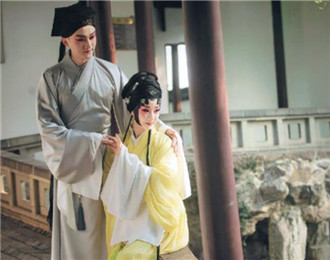A Kunqu Opera performance brings Shen Fu's famous memoir to life in its real-life setting
One can feel a bit of chill in the air at 8 pm outside the north gate of the Canglang Pavilion in Suzhou, Jiangsu province. But one soon forgets it when the hero Shen Fu and his beloved wife, Chen Yun, appear on a boat. Accompanied by a melodious flute, the two step out to be greeted by their butler.
The immersive theater version of the Kunqu Opera Six Chapters of a Floating Life, based on the book by Shen Fu, starts in front of the gate. As they walk up a stone road to Canglang Pavilion, the two performers - Zhang Zhengyao from Jiangsu Performing Arts Group's Kunqu Theater playing Shen Fu and actress Shen Guofang, as Chen Yun - are followed by the melody mingled with the sound of the wind, footsteps and whispers in the garden.


Zhang Zhengyao and Shen Guofang as Shen Fu and Chen Yun. Photos Provided to China Daily
Playwright Zhou Mian does something remarkable. It should really be called an "immersive garden" opera, for this is "Kunqu Opera plus garden", a joint effort by the local government and Yu Theatre Company, a production company based in Nanjing that specializes in foreign dramas. The garden version of the opera not only creates a classical style and setup for Kunqu Opera but also sets it on an authentic stage.
Shen Fu and his beloved wife, Chen Yun, used to live along the street near Canglang Pavilion. Built in the Northern Song Dynasty (960-1127), and listed as a UNESCO World Heritage site in 2000, Canglang Pavilion is the oldest of Suzhou's existing gardens.

The autobiographical writing of Suzhou native Shen Fu (1763-1825) is known for its acute portrayal of love, in contrast to the usual Chinese classics that mostly center on the grandeur of royal families and heroic figures.
The show Six Chapters depicts a married couple whose loving relationship stands out from the patriarchal norms of the time. Although Kim Hunter Gordon, the executive producer and translator of the play, feels it's more complex than that.
"As a character, Shen Fu has this boyish recklessness about him. Perhaps the most interesting difference between him and other male characters on the traditional Chinese stage is that this is his own first-person narrative," he says.
The couple were comfortable and elegant, living the "Suzhou lifestyle" that finds contentment in nature and everyday life.
The drama is divided into five parts: "Spring Festival", "Summer Light", "Autumn", "Winter Snow" and "Spring Again". Simple pictures of life in Suzhou are interwoven with Shen and Chen's affectionate relationship. The show's producer, Xiao Yan, founder of the Yu Theatre Company, hopes that everyone can experience the beauty of Suzhou gardens and Suzhou Opera through this play, and feel the exquisite elegance and charm of the Suzhou-style life.
"Six Chapters of a Floating Life is not only a performance but also an immersive experience in Suzhou gardens, integrating cultural and creative products, making the performance part of garden life and art life, and a one-stop viewing program for the refined and elegant Suzhou lifestyle," Xiao says.
The show tries to convey the book's love of life, the willingness to spend time and energy to go deep into every detail, to invest in it and enjoy the attitude of life.
"This was the Suzhou lifestyle for the literati of the time, but it is a lifestyle that many people want nowadays," Xiao says.
In addition to normal garden version of Kunqu Opera, the producer also introduces an abridged version for younger audiences. There are also plans next season for an English version, in which a historical foreign character appears in 19th century Suzhou as a guiding narrator to the audience. The 30-minute interactive session, which answers questions from the audience, together with the 60-minute performance is staged every Friday. The 30-minute interactive, plus 30-minute abridged show is performed every Wednesday, Saturday and Sunday.
The opera has become a window for visitors to understand Suzhou culture and the Suzhou-style life in the Qing Dynasty (1644-1911).
Gordon, the executive producer and translator, says there is a certain universal appeal to an evening performance in a beautiful garden.
"As for the play itself and its relationship to both Shen Fu's original work and Chinese culture more broadly, we've thought really hard about how to use subtitles to make it more accessible to international audiences in the most effective and concise way possible," he says.
The innovative staging of Kunqu Opera in one of Suzhou's most famous gardens has breathed new life into the traditional art form.
"The normal theatrical mechanics of microphones, elaborate lighting and an easily accessible backstage and wings are replaced with the garden setting. But the biggest difference is that it brings the actors closer to the audience. This is challenging but also invigorating, both for them and the audience. The proximity makes the detail in the singing, movement and facial expression much more apparent," Gordon says.
"The special thing about this production is that it's set in the very garden next to which Shen Fu grew up and where he and his wife, Chen Yun, first set up home. It was an important place in their life. In one episode in the book, Shen arranges for them to visit the garden in private. While much of the layout, scale and architecture of the present garden has changed since then, the current pavilion is the same one that they visited. So by coming into the actual setting of their story, the audience is invited back in time into the book itself."
In doing so, people can find some elements of the Kunqu Opera that are connected with life, and the ancient art form can continue to renew its charm. The "Kunqu plus garden" initiative gives a new lease on life to traditional Kunqu Opera.






